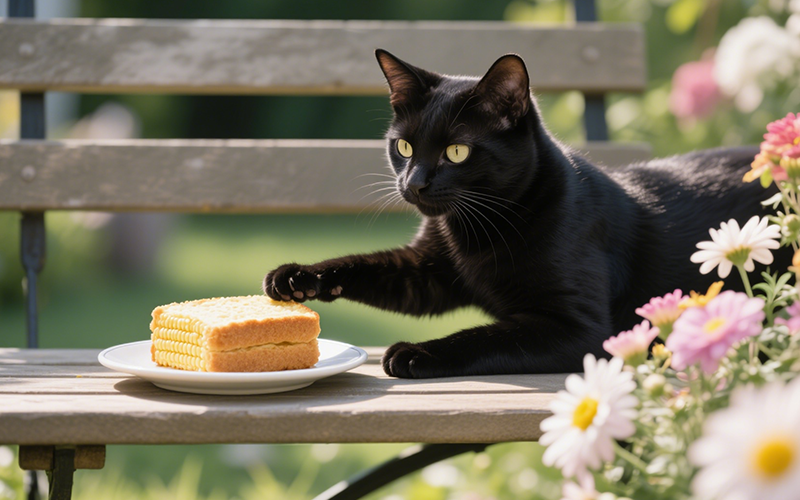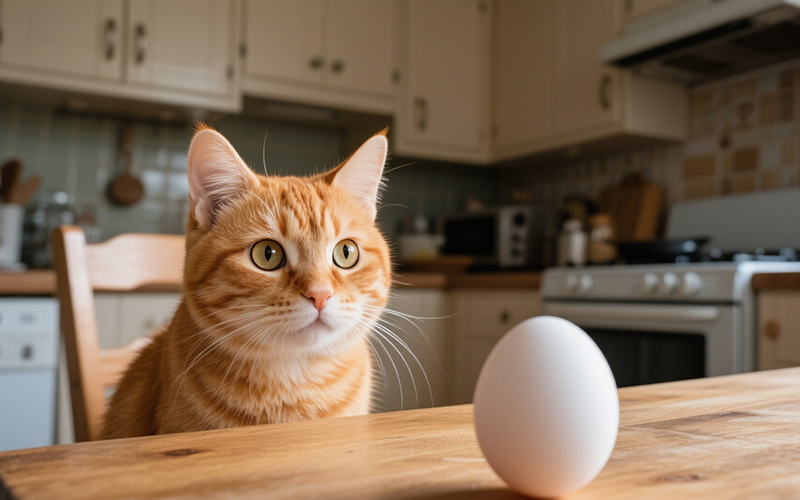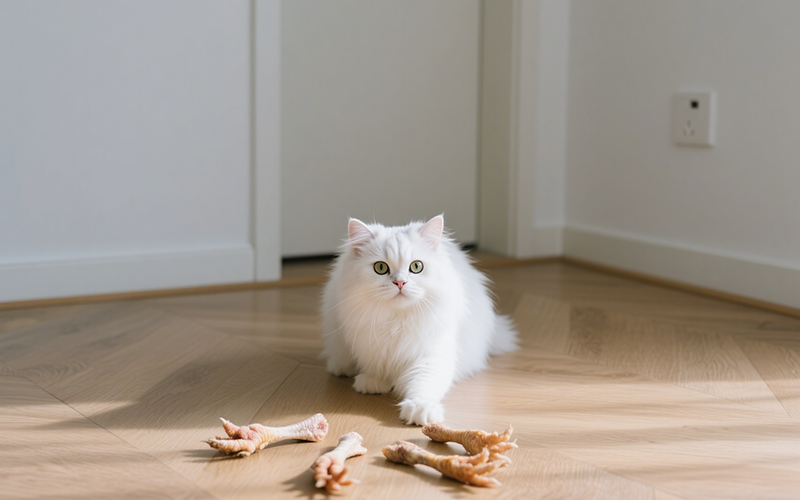Can Cats Eat Cornbread? A Crumb of Truth for Curious Cat Owners!
- 27 May 2025 09:42
The warm, comforting aroma of freshly baked cornbread can be tempting for everyone in the household, including your feline friend. As your cat eyes that golden-brown square, you might find yourself wondering: can cats eat cornbread? While a tiny, accidental nibble of plain cornbread is unlikely to cause a major emergency, it's generally not a food that's recommended for cats. Cornbread is packed with ingredients that offer little nutritional value to an obligate carnivore and can even lead to digestive upset or contribute to long-term health issues if fed regularly or in large amounts. This guide will break down why cornbread isn't an ideal treat for your cat.

Deconstructing Cornbread: Ingredients and Their Impact on Cats
To understand why cornbread isn't suitable for cats, let's look at its typical ingredients:
1. Cornmeal (Primary Ingredient)
Cornmeal is ground dried corn. While corn is a common ingredient in many commercial cat foods (often as a filler or carbohydrate source), and cats can digest it to some extent, it's not a species-appropriate primary food.
Carbohydrate Load: Cornmeal is high in carbohydrates. Cats are obligate carnivores and have evolved to get their primary energy from protein and fat, not carbohydrates. Their bodies are not as efficient at processing large amounts of carbs.
Limited Nutritional Value for Cats: While corn contains some vitamins and minerals, it lacks the essential amino acids (like taurine) and high-quality animal protein that cats need to thrive.
Potential for Allergies/Sensitivities: Some cats can be allergic or sensitive to corn, leading to skin issues (itching, rashes) or digestive upset.
2. Flour (Wheat or All-Purpose)
Many cornbread recipes also include wheat flour.
More Carbohydrates: Similar to cornmeal, wheat flour adds to the carbohydrate content.
Gluten Sensitivity: Some cats can be sensitive to gluten, which is found in wheat flour, potentially causing digestive problems.
3. Sugar
Most cornbread recipes, especially those popular in certain regions, contain a significant amount of sugar.
Empty Calories: Sugar offers no nutritional benefit to cats, only empty calories.
Weight Gain and Obesity: Excess sugar contributes to weight gain, which can lead to obesity and associated health problems like diabetes, arthritis, and heart disease.
Dental Issues: Sugar can contribute to dental problems by feeding harmful bacteria in the mouth.
Digestive Upset: Large amounts of sugar can disrupt a cat's digestive system.
Cats Can't Taste Sweetness: Interestingly, cats lack the taste receptors for sweetness, so they don't even get the same enjoyment from sugary foods as humans do.
4. Fat (Butter, Oil, Lard)
Cornbread recipes often call for butter, vegetable oil, or sometimes lard for moisture and flavor.
High Fat Content: While cats need fat, the amounts and types in cornbread can be excessive.
Digestive Upset: High-fat foods can cause vomiting, diarrhea, and abdominal discomfort in cats.
Pancreatitis Risk: A sudden influx of fatty food can trigger pancreatitis, a painful and potentially serious inflammation of the pancreas, especially in susceptible cats.
5. Eggs
Eggs are a common binder in cornbread.
Generally Safe (Cooked): Plain, cooked eggs are actually nutritious for cats, providing protein and essential amino acids. However, in cornbread, they are just one ingredient in a less ideal mix. The benefits of the egg are overshadowed by the other components.
6. Dairy (Milk, Buttermilk)
Milk or buttermilk is often used to provide moisture.
Lactose Intolerance: Most adult cats are lactose intolerant, meaning they lack sufficient lactase, the enzyme needed to digest lactose (milk sugar). Consuming dairy can lead to gas, bloating, abdominal pain, and diarrhea.
7. Salt
Salt is usually added for flavor.
Sodium Intake: While cats need some sodium, the amounts in human foods like cornbread can be too high. Excess sodium can lead to increased thirst, urination, and in large amounts, sodium ion poisoning.
8. Leavening Agents (Baking Powder, Baking Soda)
These are used to make the cornbread rise.
Generally Safe in Baked Product: In the small amounts used in a recipe and once baked, these are unlikely to cause issues. However, ingesting raw baking soda in large quantities can be problematic.
9. Potentially Harmful Add-Ins
Some cornbread variations might include ingredients that are dangerous for cats:
Onions or Chives: Sometimes added for savory flavor, these are toxic to cats.
Jalapeños or Other Spicy Peppers: The capsaicin can cause severe gastrointestinal irritation.
Cheese (High Fat/Dairy): Adds more fat and lactose.
Considering this breakdown, it's evident why the answer to "can cats eat cornbread?" leans heavily towards "no."
Why Cornbread is Not a Species-Appropriate Food for Cats
Cats are obligate carnivores. This means their evolutionary and physiological makeup dictates a diet primarily composed of animal-based protein and fat.
Limited Carbohydrate Digestion: Their digestive systems are not designed to efficiently process large amounts of carbohydrates, which form the bulk of cornbread.
Nutritional Deficiencies: Cornbread lacks the high levels of animal protein, essential amino acids (like taurine), and specific fatty acid profiles that cats require for optimal health. Feeding cornbread instead of their balanced cat food can lead to nutritional deficiencies.
"Empty" Calories: Most of the calories in cornbread come from carbohydrates and fats that don't provide significant species-appropriate nutrition for a cat, potentially leading to weight gain without proper nourishment.
| Cornbread Component | Primary Concern for Cats |
| Cornmeal/Flour | High carbohydrate load, low species-appropriate nutritional value, potential allergies/sensitivities. |
| Sugar | Empty calories, weight gain, dental issues, digestive upset. Cats can't taste sweet. |
| Fat (Butter, Oil) | Digestive upset, pancreatitis risk, obesity. |
| Dairy (Milk, Buttermilk) | Lactose intolerance leading to gas, bloating, diarrhea. |
| Salt | Can be excessive, leading to increased thirst or sodium imbalance if large amounts ingested. |
| Harmful Add-Ins (Onions, Spices) | Potential toxicity (onions, garlic) or severe GI irritation (spicy peppers). |
What If My Cat Ate Some Cornbread?
If your cat snatches a small piece of plain cornbread (with no toxic add-ins like onions):
Don't Panic: A tiny amount is unlikely to cause severe illness in a healthy adult cat.
Assess the Cornbread: Were there any dangerous ingredients like onions, garlic, or xylitol (if it was a sugar-free human product, though unlikely in typical cornbread)? If so, call your vet immediately.
Monitor Your Cat: Watch for any signs of digestive upset over the next 12-24 hours:
Vomiting
Diarrhea
Lethargy
Loss of appetite
Abdominal discomfort
Contact Your Vet if Concerned: If your cat ate more than a tiny crumb, if the cornbread contained potentially harmful ingredients, or if your cat shows any signs of illness, contact your veterinarian for advice. This is especially important if your cat is very young, very old, or has pre-existing health conditions (like diabetes, as the sugar and carbs can affect blood glucose).
PettureX: Your AI Assistant for Pet Food Safety Queries
When you're unsure if a human food is safe for your cat, having quick access to general information can be very helpful. The PettureX app is designed as an AI-powered resource for pet owners.
PettureX offers:
24/7 AI Consultation: You can ask general questions like "Is cornmeal safe for cats?" or "What happens if a cat eats sugar?" The AI chatbot can provide instant information based on widely accepted veterinary knowledge. It can help you understand why certain ingredients are problematic for cats and reinforce the importance of a species-appropriate diet. For specific health concerns or if your cat has ingested something potentially harmful, it will always advise consulting a veterinarian.
PettureX can be a useful tool for quickly checking general food safety information, helping you make informed decisions to protect your cat's health.
Healthier Treat Alternatives for Your Cat
If you want to offer your cat a special treat, skip the cornbread and choose from these much healthier, species-appropriate options:
Plain, Cooked Meat: Small pieces of unseasoned cooked chicken, turkey, lean beef, or fish (like salmon or tuna in water, no salt added).
Commercial Cat Treats: Opt for high-quality treats specifically formulated for cats. Look for those that are high in protein and low in carbohydrates and artificial additives.
Freeze-Dried Meat Treats: Single-ingredient treats like freeze-dried chicken, salmon, or liver are often a big hit.
A Small Amount of Plain, Cooked Egg: Scrambled or hard-boiled, with no salt or oil.
Catnip (for some cats): An enjoyable, non-food treat for cats who respond to it.
Remember, treats should only make up a small portion (no more than 10%) of your cat's daily caloric intake.
Conclusion: Cornbread is Best Left Off Your Cat's Menu
To definitively answer the question, "can cats eat cornbread?" – while a tiny, plain crumb is unlikely to cause a catastrophe, cornbread is not a recommended or healthy food for cats. It's high in carbohydrates, sugar, and fat, often contains dairy (to which many cats are intolerant), and provides little nutritional value for an obligate carnivore. Furthermore, some variations can contain ingredients that are toxic or highly irritating to felines.
To keep your cat healthy and thriving, stick to their high-quality, balanced cat food and offer species-appropriate treats. Reserving cornbread for human enjoyment is the best way to ensure your furry friend doesn't suffer any unnecessary digestive upset or health complications.
Frequently Asked Questions (FAQs)
Q1: Is corn itself bad for cats? My cat food has corn in it.
A: Corn, in moderation and when properly processed (as in commercial cat food), is digestible for cats and can serve as a source of carbohydrates and some nutrients. Many cat foods use corn gluten meal as a protein source or ground corn as a carbohydrate. The issue with cornbread is the high concentration of cornmeal combined with other unsuitable ingredients like sugar, fat, and dairy, making the overall product unhealthy. A small amount of corn as an ingredient in a balanced cat food is different from feeding a cat a carb-heavy human baked good.
Q2: What if my cornbread is sugar-free and dairy-free?
A: Even if "healthier" versions are made, it would still be primarily cornmeal and flour (high carbs) and likely contain fats. More importantly, "sugar-free" human products sometimes contain artificial sweeteners like xylitol, which is EXTREMELY TOXIC to dogs and potentially harmful to cats (though less studied, it's best to avoid). Always check labels meticulously for xylitol in any sugar-free human food.
Q3: My cat seems to love the taste of cornbread. Why?
A: Cats might be attracted to the texture, warmth (if freshly baked), or the fat content in cornbread. They are also curious creatures and might be interested because they see you eating it. However, their interest doesn't mean it's good for them or that they are truly "enjoying" all its flavor components (like sweetness, which they can't taste).
Q4: Can cats eat plain corn tortillas or corn chips?
A:
Plain Corn Tortillas: A very tiny piece of a plain, unseasoned corn tortilla is unlikely to be harmful but offers no real nutritional value. They are just carbohydrates.
Corn Chips: Definitely not. Corn chips are typically high in fat, salt, and often have artificial flavorings or powders (like cheese powder, which has dairy, or nacho flavorings, which can have onion/garlic powder).
Q5: Could cornbread cause an allergic reaction in my cat?
A: Yes, it's possible. Cats can be allergic to various ingredients, including corn or wheat, which are primary components of cornbread. An allergic reaction might manifest as itchy skin, skin lesions, or digestive upset. Dairy could also cause a reaction if your cat is intolerant.
Q6: How much cornbread is too much for a cat?
A: Ideally, none. Since it offers no nutritional benefits and carries potential risks, there's no "safe" amount to recommend as a regular treat. Any amount displaces more nutritious food. A tiny, accidental crumb is one thing, but intentionally feeding even a "small piece" regularly is not advisable.
Related

Can Cats Eat Egg Yolk Raw? A Vet's In-Depth Guide to Feline Nutrition & Safety
- 10 Jun 2025
Can Cats Eat Dog Kibble? Unpacking the Nutritional Mismatch!
- 29 May 2025
Can Cats Eat Deli Turkey? Slicing Through the Facts for Your Feline!
- 29 May 2025
Can Cats Eat Deer Meat? Exploring Venison for Your Feline!
- 28 May 2025
Can Cats Eat Corned Beef? Unpacking This Salty Human Delicacy!
- 28 May 2025
Can Cats Eat Cooked Rice? The Grain Truth for Your Feline Friend!
- 27 May 2025
Can Cats Eat Cooked Meat? Sizzling Facts for Your Feline's Feast!
- 26 May 2025
Can Cats Eat Chili? Spicing Up the Truth About This Human Dish!
- 26 May 2025
Can Cats Eat Chicken Eggs? Cracking the Code on This Feline Food Query!
- 24 May 2025
Can Cats Eat Chicken Feet? A Paw-sitive or Negative Treat?
- 24 May 2025
